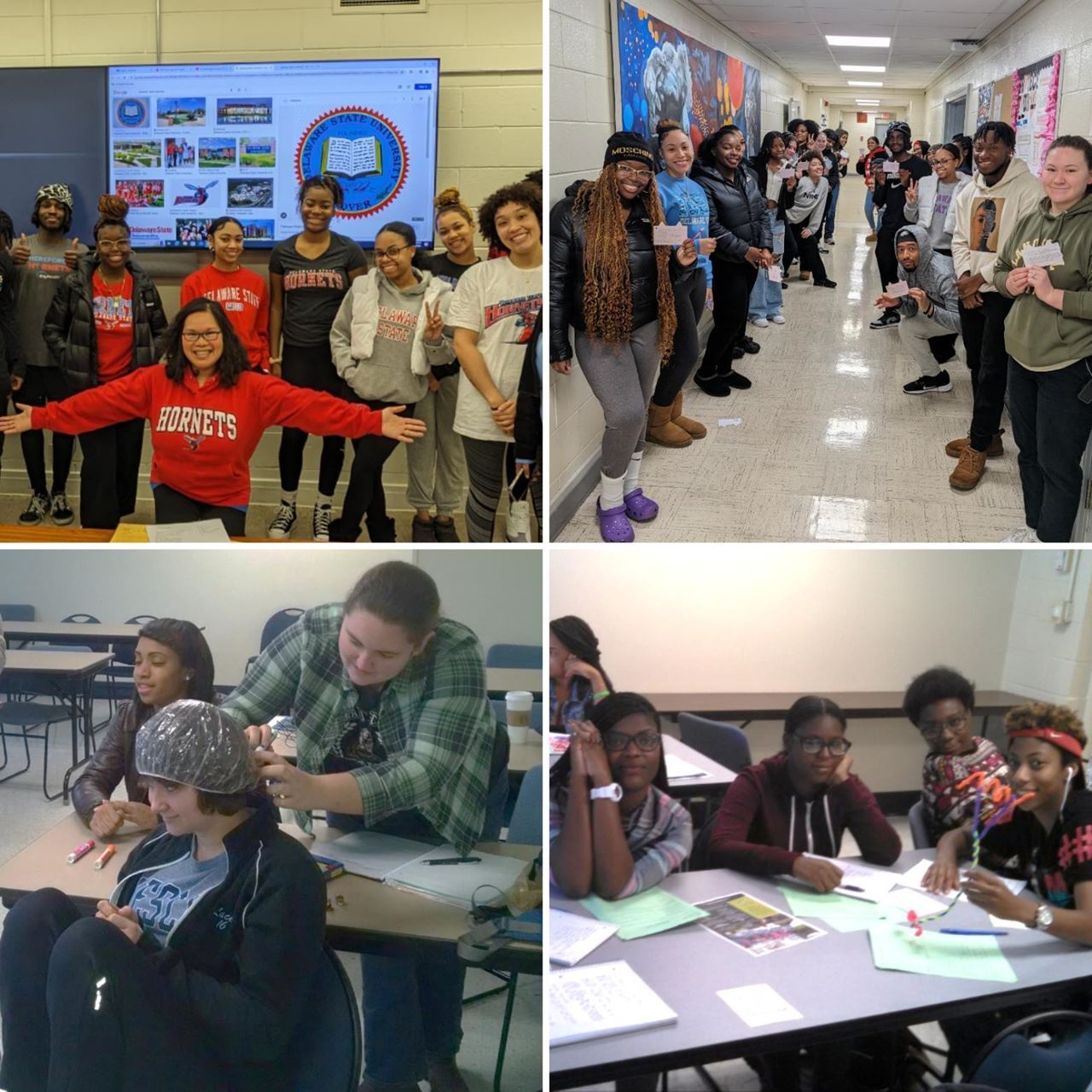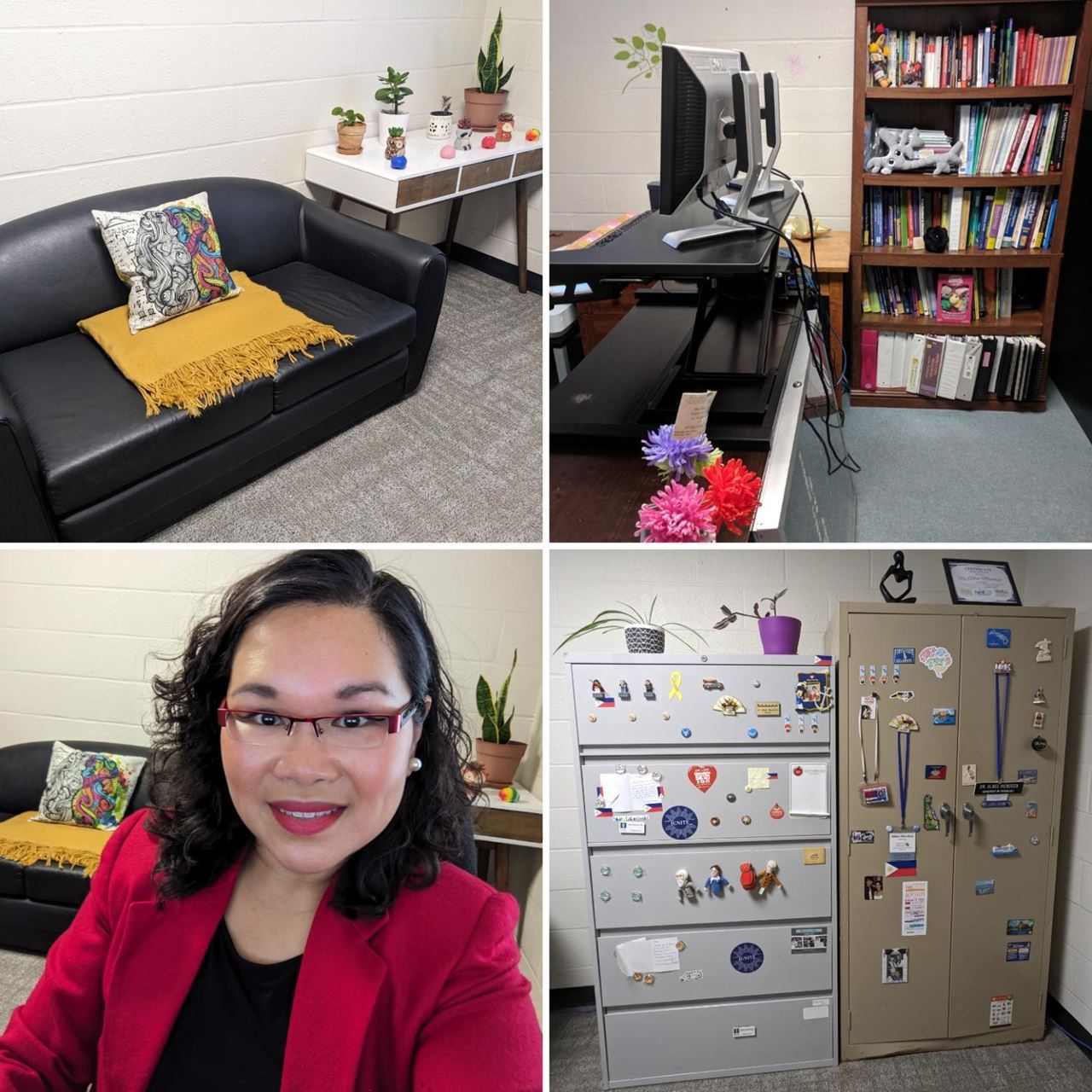 School name: Delaware State University (DSU or DelState)
School name: Delaware State University (DSU or DelState)
Type of school: HBCU
School locale (including state and country): Dover, Delaware, USA
How many years have you taught psychology? Since graduating from East Carolina University’s PhD program, I have been teaching full-time for nine years!
Classes you teach: Most of the classes I teach are traditional, in-person courses. Introduction to General Psychology, Honors Introduction to General Psychology, Health Psychology, Abnormal Psychology, Principles of Psychopathology, Psychology of Learning, Senior Research Seminar.
Specialization: My doctoral degree is in Health Psychology with a specialization in Pediatric School Psychology.
Average class size: 30 to 35 students
What’s the best advice about teaching you’ve ever received? At ECU, I had the honor to take courses about teaching as a graduate student and one piece of advice that I have implemented ever since is to structure class time in 10 to 20-minute chunks to hold students’ attention and foster engagement (e.g., in a 50-minute class: lecture, group work, lecture, video clip, lecture, review).
What book or article has shaped your work as a psychology teacher?
- Keeley, J., Afful., S. E., Stiegler-Balfour, J. J., Good, J. J., & Leder. S. (2013). So you landed a job – What’s next? Advice for early career psychologists from early career psychologists. Retrieved from the Society for the Teaching of Psychology web site.
- Hogan, K.A. & Sathy, V. (2022). Inclusive Teaching: Strategies for Promoting Equity in the College Classroom. West Virginia University Press.
Briefly tell us about your favorite lecture topic or course to teach. It is so hard to choose! I will narrow it down to two. I really like teaching students about parts of the brain. Students like it because we do a lot of drawings and hands-on activities like making neurons out of pipe cleaners and drawing the lobes on each other while wearing shower caps. Another favorite of mine is on operant conditioning principles of +R, -R, +P, and -P. With a background in Applied Behavior Analysis, I enjoy teaching students about the differences and similarities among punishment and reinforcement techniques. In groups, students are asked to give examples of how to utilize these principles in their professional careers (e.g., teach a class of noisy ballet dancers) and personal lives (e.g., deal with a messy roommate).
 Briefly describe a favorite assignment or in-class activity. I introduce an activity called Speed Meeting on the first day of class to get to know each other. Students write down certain facts on an index card. Then, we go out in the hallway and make two lines. Students have a partner and talk to that partner about what they wrote down on the card for about 1 minute. Then, after the timer sounds, one line moves down so each student has a different partner. We rotate two or three more times. I bring it back as a review activity throughout the semester.
Briefly describe a favorite assignment or in-class activity. I introduce an activity called Speed Meeting on the first day of class to get to know each other. Students write down certain facts on an index card. Then, we go out in the hallway and make two lines. Students have a partner and talk to that partner about what they wrote down on the card for about 1 minute. Then, after the timer sounds, one line moves down so each student has a different partner. We rotate two or three more times. I bring it back as a review activity throughout the semester.
What teaching and learning techniques work best for you? There are so many to talk about! From my most recent course evaluations and written feedback, I believe that the teaching and learning techniques that are working for my students include learning each of my student’s names, holding students accountable for coming to class by taking daily attendance, providing skeletal notes, using Power Points for lecture, doing sample test questions, reviewing content learned at each class session, and providing time in class to engage in group work.
 What’s your workspace like? Since the pandemic, my daughter, husband and I have developed into plant parents. My office is home to a variety of plants: jade (crassula ovata), spider (chlorophytum comosum), snake (dracaena trifadciata), fantasy venice (tradescantia nanouk), and mother of millions (kalanchoe delagoensis). Our home office has a lot more! I also have a standing desk with two screens, a couch, and filing cabinets decorated with magnets from places traveled or activities that make me smile.
What’s your workspace like? Since the pandemic, my daughter, husband and I have developed into plant parents. My office is home to a variety of plants: jade (crassula ovata), spider (chlorophytum comosum), snake (dracaena trifadciata), fantasy venice (tradescantia nanouk), and mother of millions (kalanchoe delagoensis). Our home office has a lot more! I also have a standing desk with two screens, a couch, and filing cabinets decorated with magnets from places traveled or activities that make me smile.
Three words that best describe your teaching style. I want to share the most frequently-used words from last semester’s course evaluations and student feedback because they validate what I want to accomplish in the classroom! Welcoming, Interactive, and Engaging.
What is your teaching philosophy in 8 words or fewer? Encouraging mutual learning through support, relevance, and kindness.
Tell us about a teaching disaster (or embarrassment) you’ve had and how you dealt with the situation. There are countless times when I planned activities and they have fallen flat! One of them early in my career was when I was a graduate assistant for an Introduction to Psychology class with 100+ students and prepared a game to do as a review which utilized Glee (yes, I was a Gleek!) cards. I assigned different Glee character cards as certain letters which coordinated with different questions. I did not write down what cards matched with what letter, so everyone got confused! I learned that I needed to try out different activities with friends or loved ones before implementing them in the classroom.
What about teaching do you find most enjoyable? In terms of the quality of life as an instructor, I love the schedule of being a professor. Having breaks throughout the year as well as summers off helps with spending time with my daughter, husband, and family. I also love how each semester is a fresh start for students and faculty and staff. I like that I can make changes to a course and modify techniques based on feedback and outcomes. I also love how each academic year is filled with excitement about coming to college and then graduating from college! I truly enjoy helping students with their own career trajectories, discussing the many opportunities available to them, and the people/departments/resources in college that can support them towards their goals. I hold first-generation college students and students with children especially dear to my heart.
What is something your students would be surprised to learn about you? I am an ovarian cancer survivor. I was diagnosed in summer 2019 and continued teaching after a radical hysterectomy and throughout chemotherapy. I received tenure in 2020 as an associate professor at Wesley College. When it was acquired by DSU, I lost status and tenure. I was Visiting Assistant Professor during a probationary period and just recently transitioned to tenure-track Assistant Professor. I discuss teaching through cancer and other aspects of my career in a recent article in the Diverse: Issues in Higher Education magazine.
 What are you currently reading for pleasure? For me, Murder and Mamon by Mia P. Manansala (Book 4 of the A Tita Rosie’s Kitchen Mystery). With my daughter, Maybe Maybe Marisol Rainey by Erin Entrada Kelly. Filipina authors write these books, and I heard about them from being a member of the Filipinx Author Book Club. I am so inspired by the authors who talk about their journeys that I am taking classes to write my own middle grade novel!
What are you currently reading for pleasure? For me, Murder and Mamon by Mia P. Manansala (Book 4 of the A Tita Rosie’s Kitchen Mystery). With my daughter, Maybe Maybe Marisol Rainey by Erin Entrada Kelly. Filipina authors write these books, and I heard about them from being a member of the Filipinx Author Book Club. I am so inspired by the authors who talk about their journeys that I am taking classes to write my own middle grade novel!
What tech tool could you not live without? As a professor, there are several tools that I need to make my days less stressful including Outlook, Google Calendar, Color Note, Power Point, etc. Before 2022, I would have probably said my flash drive(s), then I bought an expensive one which stopped working and I switched to One Drive and Google Drive.
What is your hallway chatter like? What do you talk to colleagues about most (whether or not it is related to teaching/school)? Very often it is about technology issues that we are experiencing in our classrooms! Other topics include when meetings and parties are as well as student issues (the good, the bad, and the ugly).
Has your teaching changed because of the Covid19 pandemic? If so, how? I make sure to emphasize social support and add in readings to help students feel that they are not alone in their academic journeys. To this end, I also find myself disclosing more about myself. Notably, when discussing social support through community service, I tell my students about volunteering for a nonprofit, Pursuit for Peace, which is an organization with volunteers who dress up as princesses and visit medically vulnerable populations. In terms of assignments, I remember a talk from ACT 2022 about bending not breaking the rules/standards. I implement more grace periods for late work as well as drops for assignments and quizzes. I also make sure to emphasize the importance of in-person interactions and oral presentations.
